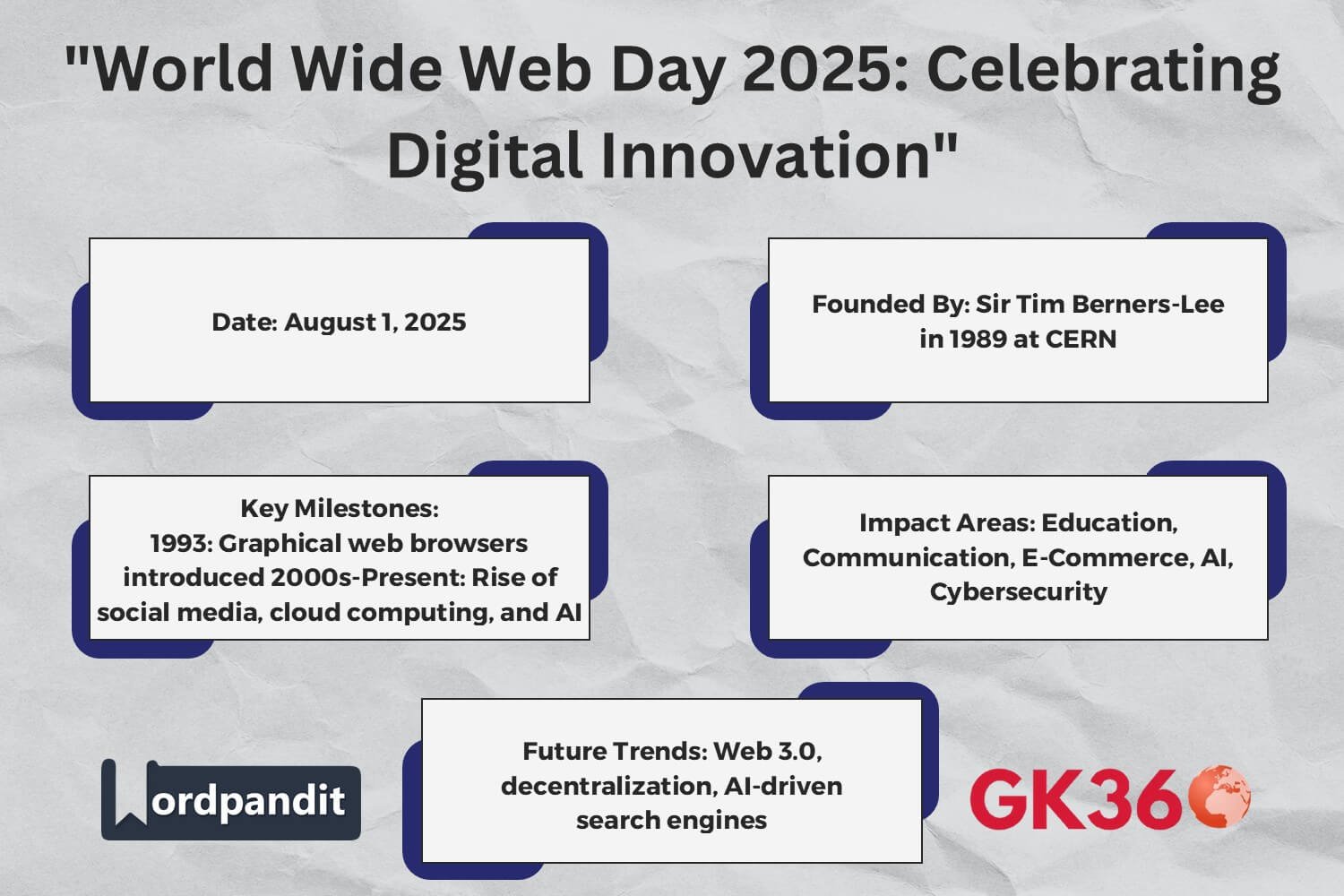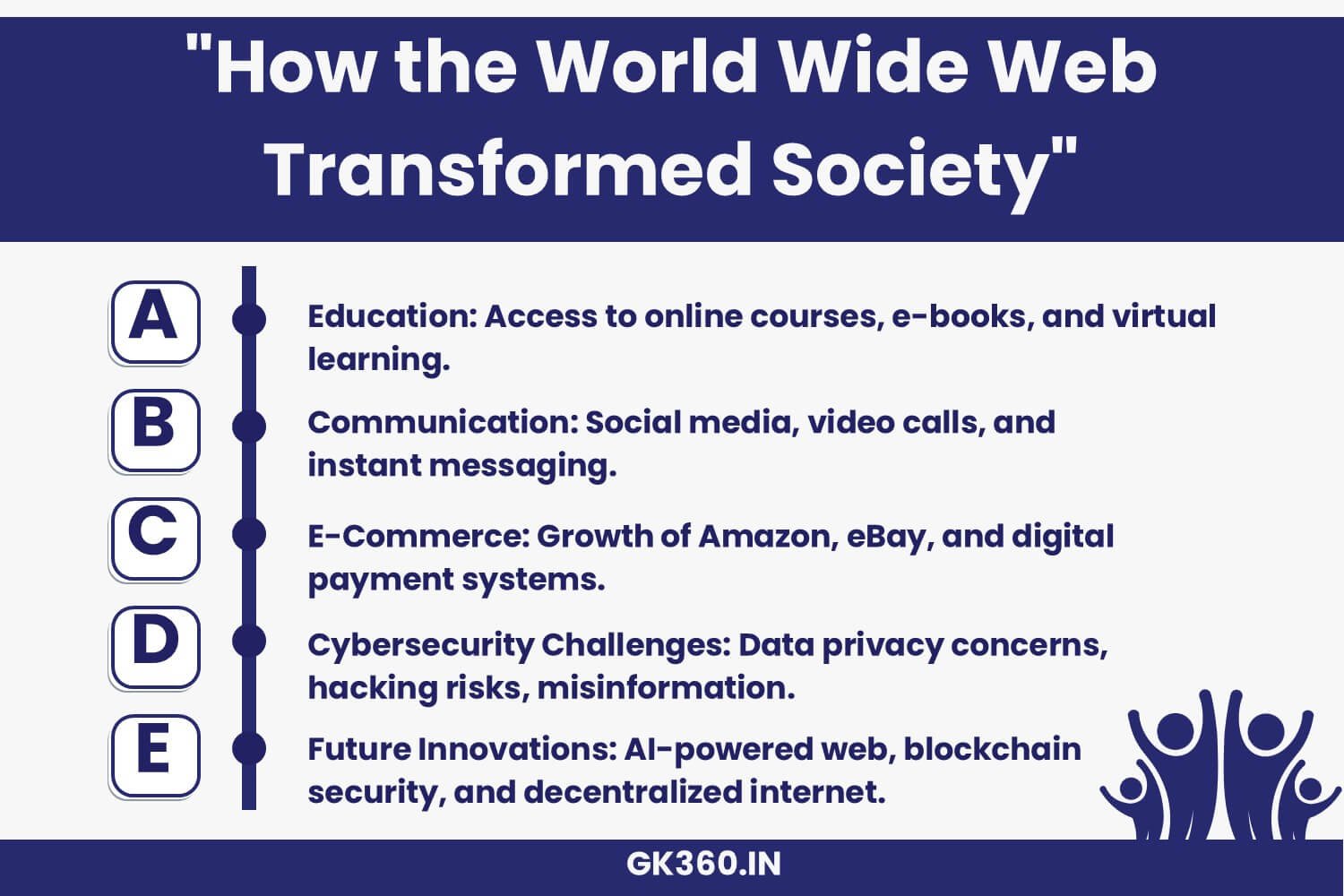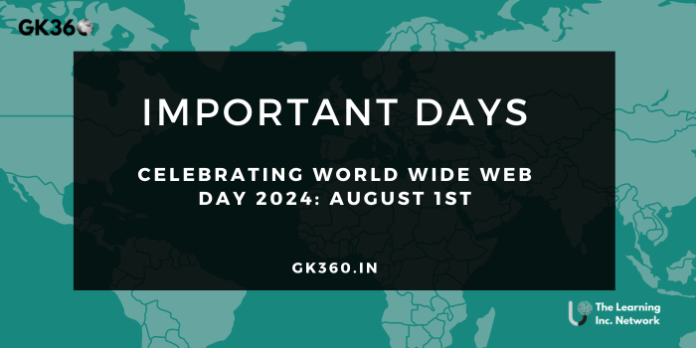World Wide Web Day 2025: History, Significance, and Global Impact
Introduction
Every year on August 1, the world celebrates World Wide Web Day, a day dedicated to recognizing the immense impact of the internet on modern society. From revolutionizing communication to transforming education, commerce, and entertainment, the World Wide Web (WWW) has reshaped every aspect of our lives. But how did it all begin? What role does it play today, and what does the future hold? Let’s explore the history, significance, and lasting influence of the web on our digital world.

Table of Contents
- What is World Wide Web Day?
- History of the World Wide Web
- The Impact of the World Wide Web
- Challenges and Ethical Considerations
- Practical Implications for Competitive Exams
- FAQs
- Conclusion & Call to Action
What is World Wide Web Day?
World Wide Web Day is an annual observance on August 1, celebrating the invention of the WWW and its contribution to global connectivity. This day acknowledges how the web enables us to access information instantly, connect with people worldwide, and engage in the digital economy.
History of the World Wide Web
1989: Tim Berners-Lee’s Invention
The World Wide Web (WWW) was invented by Sir Tim Berners-Lee while working at CERN. His vision was to create a system that allowed researchers to share information easily through hyperlinked documents.
1991: Public Availability
On August 6, 1991, Berners-Lee launched the first-ever public web page, opening the doors to a new era of digital communication.
1993-1996: Browser Revolution
- 1993: Mosaic, the first graphical web browser, made the web user-friendly.
- 1994: Netscape Navigator introduced new features, increasing web adoption.
- 1996: Internet Explorer was integrated into Windows, bringing the internet to homes worldwide.
2000s-Present: Web 2.0 and Beyond
- Rise of social media, cloud computing, and e-commerce.
- Introduction of AI, IoT, and blockchain to enhance user experiences.
- Development of Web 3.0, emphasizing decentralization and AI-driven interactions.
The Impact of the World Wide Web
1. Education & E-Learning
- Access to online courses, digital libraries, and research materials.
- Rise of MOOCs (Massive Open Online Courses) and virtual learning.
2. Communication & Social Media
- Platforms like Facebook, Twitter, Instagram, and LinkedIn revolutionized interaction.
- Instant messaging and video calls through WhatsApp, Zoom, and Skype.
3. E-Commerce & Digital Economy
- Online shopping through Amazon, eBay, and Alibaba.
- Growth of freelancing, remote work, and digital marketing.
4. Innovation & Future Technologies
- Integration of AI, Virtual Reality (VR), and the Internet of Things (IoT).
- Blockchain technology enhancing digital security and transparency.
Challenges and Ethical Considerations
Despite its advantages, the World Wide Web presents several challenges:
- Privacy & Cybersecurity Risks: Rising cyber threats and data breaches.
- Digital Divide: Unequal internet access between developed and developing nations.
- Misinformation & Fake News: The spread of unverified or misleading content.
Practical Implications for Competitive Exams
For aspirants preparing for government exams, technology-related tests, and interviews, understanding the World Wide Web’s evolution and impact is essential. Key areas to focus on:
- Milestones in Internet History.
- Impact of the web on various sectors.
- Current and future web technologies.
- Cybersecurity and digital ethics.
- Practice MCQs related to web history and IT advancements.

FAQs
Who invented the World Wide Web?
Sir Tim Berners-Lee invented the World Wide Web in 1989 while working at CERN.
What is the significance of August 1 in Internet history?
August 1 is celebrated as World Wide Web Day to honor the web’s role in transforming global communication and digital accessibility.
How has the internet changed education?
The web has made education more accessible, with e-learning platforms offering courses, certifications, and digital libraries to students worldwide.
What are the major cybersecurity risks on the web?
Key concerns include hacking, phishing, identity theft, and data breaches that compromise user privacy and financial security.
What are the future trends in web technology?
Upcoming innovations include Web 3.0, AI-driven search engines, decentralized internet models, and enhanced cybersecurity frameworks.
Conclusion & Call to Action
World Wide Web Day 2025 is a celebration of the technological revolution that has connected the world like never before. From its inception in 1989 to its role in shaping the future of AI, blockchain, and cybersecurity, the web continues to redefine human interaction and innovation.
As we move toward an increasingly digital future, it is essential to ensure ethical internet usage, bridge the digital divide, and safeguard online privacy. Let’s use this day to appreciate the power of the web while working towards a more secure and inclusive digital world.
Key Takeaways Table
| Aspect | Details |
|---|---|
| Event | World Wide Web Day 2025 |
| Date | August 1, 2025 |
| Inventor | Sir Tim Berners-Lee (1989) |
| First Website Launch | August 6, 1991 |
| Major Transformations | Social Media, E-Learning, Digital Economy |
| Key Challenges | Cybersecurity, Digital Divide, Misinformation |
| Future of the Web | Web 3.0, AI, Blockchain, Decentralization |
Related terms
- World Wide Web Day 2025
- History of the Internet and WWW
- Tim Berners-Lee and Web Invention
- Impact of the World Wide Web on Society
- Future of Web 3.0 and AI Internet
- Cybersecurity Challenges in Digital Era
- Internet Evolution Timeline
- Role of WWW in Education and Business
- Digital Economy Growth and E-Commerce
- How the Internet Changed the World





